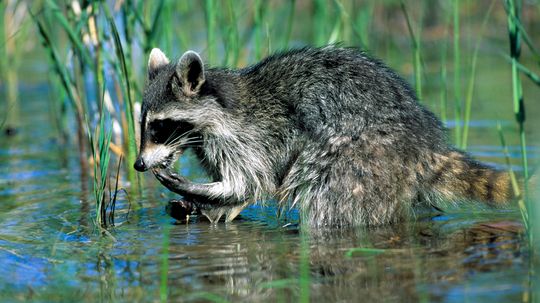Delving into the depths of nature’s enigmas, we find ourselves captivated by the peculiar habits of raccoons and their inexplicable inclination towards cleansing their sustenance. This article aims to explore the underlying reasons behind this seemingly mundane yet fascinating behavior.
An Instinctual Quandary: The Evolutionary Origins
Intricately woven within the fabric of raccoon biology lies an ancient instinct passed down through generations. This ritualistic act can be traced back to their ancestors who inhabited lush forests, where food preservation was paramount for survival. By meticulously washing their food, these resourceful creatures aimed to remove any potential contaminants or unwanted odors that could attract predators.
A Sensory Symphony: Unlocking Nature’s Secrets
Beyond mere cleanliness, this ritual holds a deeper purpose rooted in sensory perception. As nocturnal beings with heightened tactile senses, raccoons rely heavily on touch to navigate and understand their surroundings. Washing their food allows them to enhance its texture and feel, enabling them to discern its quality and ripeness more effectively.
The Power of Adaptation: A Cunning Strategy
Raccoons have proven themselves as masters of adaptation throughout history. In urban environments where water sources are abundant but natural prey is scarce, they have ingeniously repurposed this ancestral behavior. By submerging their meals in water bowls or puddles found amidst concrete jungles, they mimic the conditions necessary for optimal consumption while adapting it seamlessly into modern habitats.
Unveiling a Multifaceted Mystery: Theories Abound
Scientists continue to unravel various theories surrounding this captivating phenomenon. Some propose that washing food may serve as a form of social communication, leaving scent markers for other raccoons to detect and interpret. Others suggest that it could be an instinctual response triggered by the presence of water, akin to how cats are drawn to play with liquid substances.
A Window into Nature’s Complexity: The Conclusion
As we peer through the intricate lens of nature’s complexity, the enigma surrounding raccoons’ washing behavior remains partially shrouded in mystery. While evolutionary instincts and sensory perception offer compelling explanations, this captivating ritual continues to captivate our imagination. Let us embrace these mysteries as reminders that even within seemingly ordinary acts lie extraordinary tales waiting to be unveiled.


